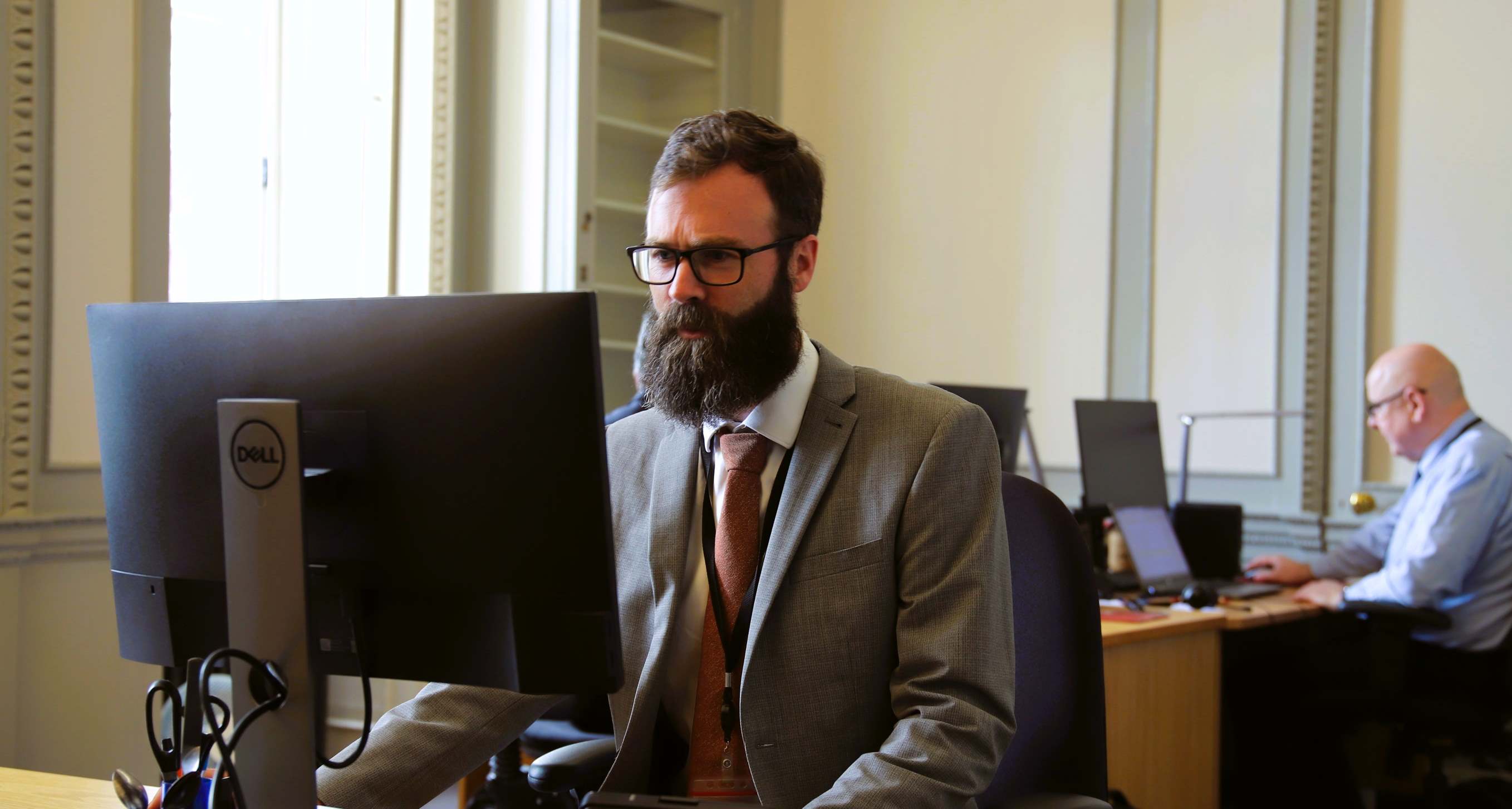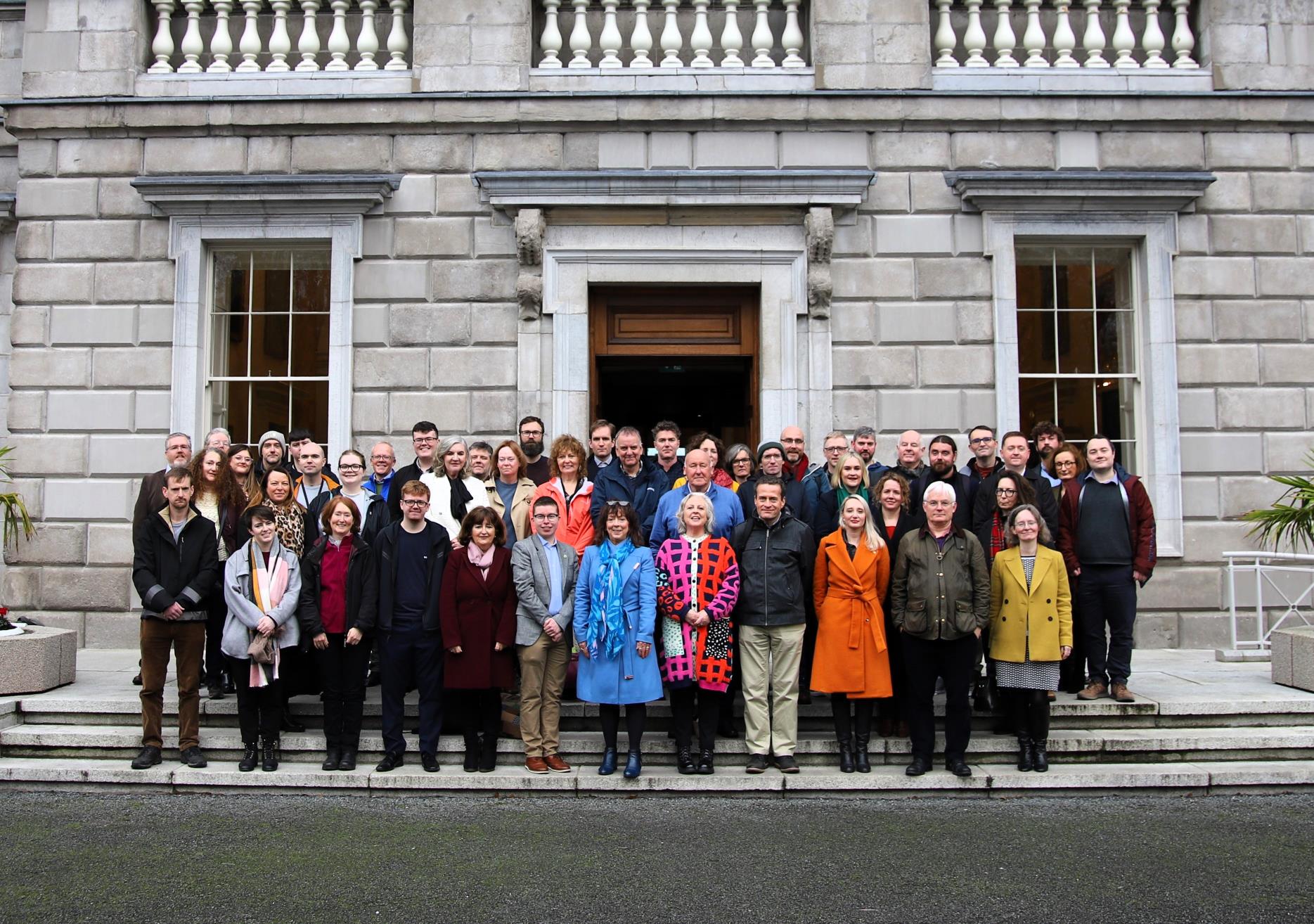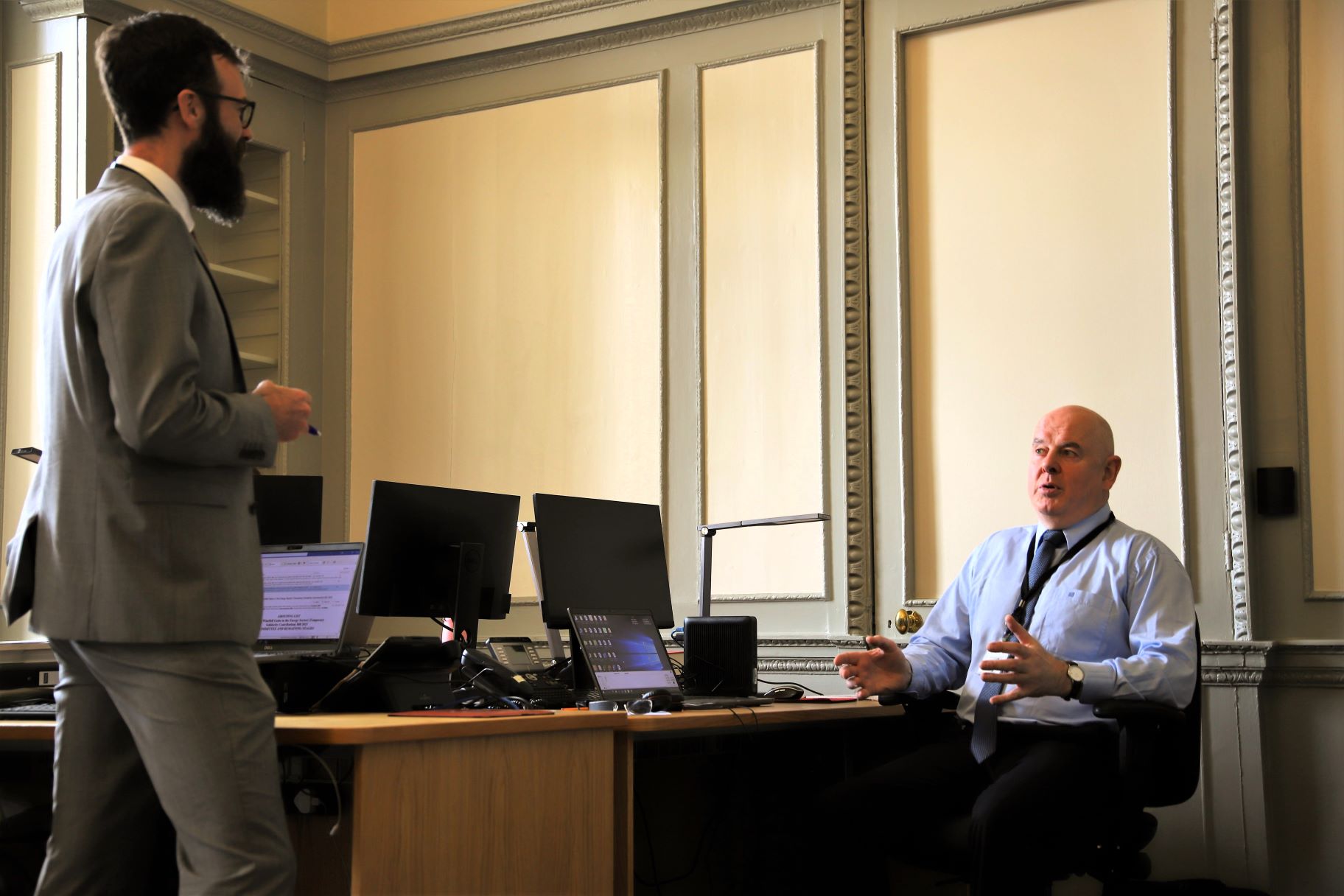Every time the Dáil, Seanad or an Oireachtas committee sits in public, an Official Report is produced of everything that is said. The Debates Office, under the direction of the Ceann Comhairle, is tasked with producing it.

Starting the day
The Debates Office comprises a team of parliamentary reporters and editors, as well as supporting staff. In producing the Official Report they work with many other sections in the Service, taking in committees, parliamentary questions and political staff.
Parliamentary reporter Cian Fitzsimons describes a typical day for him in Leinster House reporting the debate in Dáil Éireann.
9.30 a.m.
Today I am working on reporting Dáil proceedings. Tuesdays, Wednesdays and Thursdays are sitting days for the Dáil, Seanad and committees and today Leinster House will be bustling well before I start for the day.
My team is just one of several in the Debates Office with different tasks on a typical sitting day. Another team is already at work producing the report for the Seanad and committees and there is a small group tasked with logging proceedings for debate that cannot be transcribed immediately. There is also an indispensable support staff, which compiles and distributes work rosters, carries out publication and logging tasks and generally ensures efficiency in our workflow in many other ways.
It's a sizeable but tight-knit group.

Staff of the Debates Office, which comprises parliamentary reporters, editors and supporting staff
11:30 a.m.
I had a late finish last night, not leaving the office until after midnight, so I’m one of the last reporters to start work today.
Each weekday, a team of 14 reporters is tasked with reporting Dáil proceedings and the report is published incrementally on the Oireachtas website throughout the sitting day.
My colleagues reporting the Seanad and committees will have a more standard working day and should be all done by 6 p.m.
A timeline of a typical day of a parliamentary reporter assigned to report Dáil debates. A later start is offset by later finishing.
Noon
I’m due in the Chamber at 12 noon and make my way through the double doors to take my seat at the reporters’ desk, which is on the floor of the Chamber in front of the Ceann Comhairle and the Clerk of the Dáil. It's right in the middle of things.
Proceedings in the Chamber are digitally recorded and reporters use this recording when they return to their workstations to prepare their ten-minute section of the debate, known as a "take".
Leaders’ Questions, usually taken by the Taoiseach or Tánaiste, are when the Opposition gets a chance to raise the most pressing issues of the day. Depending on the subject under debate, this can be an animated discussion, with a full Chamber and multiple interjections from both sides.
As reporters sit in the middle of the Chamber, we are well placed to pick up on who is speaking, as well as who is about to interrupt or heckle the speaker. Along with recognising Members by name and face, reporters are usually able to recognise speakers by voice, which comes in handy when an interjection comes from the packed backbenches.
After ten minutes, a colleague comes in to take over and I head back to my workstation.
2.20 p.m.
I’m back into the Chamber, this time for Questions to the Taoiseach. Parliamentary questions offer Deputies an opportunity to submit a question to the Taoiseach or a Minister on an issue relating to their Department. The replies are provided either orally in the Chamber, which gives an opportunity for follow-up discussion on the issue, or as a written answer.
Questions and their replies are published by the Debates Office and their number has been steadily increasing. Today, there are more than 800 questions for written reply to be dealt with and these will be divided up among reporters.
3.50 p.m.
In publishing parliamentary questions, the Debates Office is building on a process that begins when a Member submits a question to the Questions Office in Leinster House. The question is sent to the appropriate Department for reply, which is then processed by the Questions Office so it can be published to the web.
After working on my take for a while, I take a short break to have a chat with one of my colleagues who is co-ordinating the publication of replies for those 800 questions; in 2022 there were more than 58,000 questions and replies published to the web.
This interactive graphic details the number of questions asked by constituency, political party, question type and Department this year.
5.30 p.m.
After a 60-minute sos, the House has moved on to deal with several pieces of legislation. Every Bill must go through several Stages in the Dáil and Seanad. Members have opportunities to discuss the legislation and to table amendments on it.
There are set procedures for dealing with the passage of Bills and the Debates Office must ensure the Official Report reflects these procedures. For my next two takes I’ll need to pull in amendments to the Bills and double-check the procedural guidelines set out in the office’s Editors’ Book, a comprehensive guide to house style and procedure, before making the takes ready for the editors.
8.10 p.m.
While parliamentary reporters sit in the Chamber and compile the report, a team of editors is also required to check this work before publication. Some of the editorial staff are editing the Dáil's Official Report at this point and will stay until the House rises.
The Official Report of a long Dáil day like today could contain up to 100,000 words or even more, and maintaining a rigorous editorial process keeps mistakes to a minimum.
Graphic detailing the word counts of debates in each House or committee in the current year; bigger circles indicate more words spoken and reported. The word count for all parliamentary debates in 2023 was over 23 million words.
10.10 p.m.
The weekly division or voting time is usually set as the final item of business on Wednesdays. Once a division is claimed, Members have a short window in which to get to the Chamber to cast their votes. Rather than these divisions being taken at intervals throughout the week, the majority are now deferred to this slot.
Reporting divisions is usually straightforward, allowing me to finish up before 11 p.m. That said, concentration is required to maintain attention to detail and accuracy even at the end of a long day’s work. The work can be demanding but that is more than compensated for by the feeling of satisfaction when it all comes together, as well as the opportunity to sometimes be right in the middle when history is being made.

The Editor of Debates and Chief Reporter, Anne Maxwell, inspecting Official Report bound volumes at the reporters' desk in the Dáil Chamber.
Further information
- If you'd like to find out more about the work of the Debates Office, contact us:
-
Debates Office
Leinster House
D02 XR20
+353 (1) 6183000


